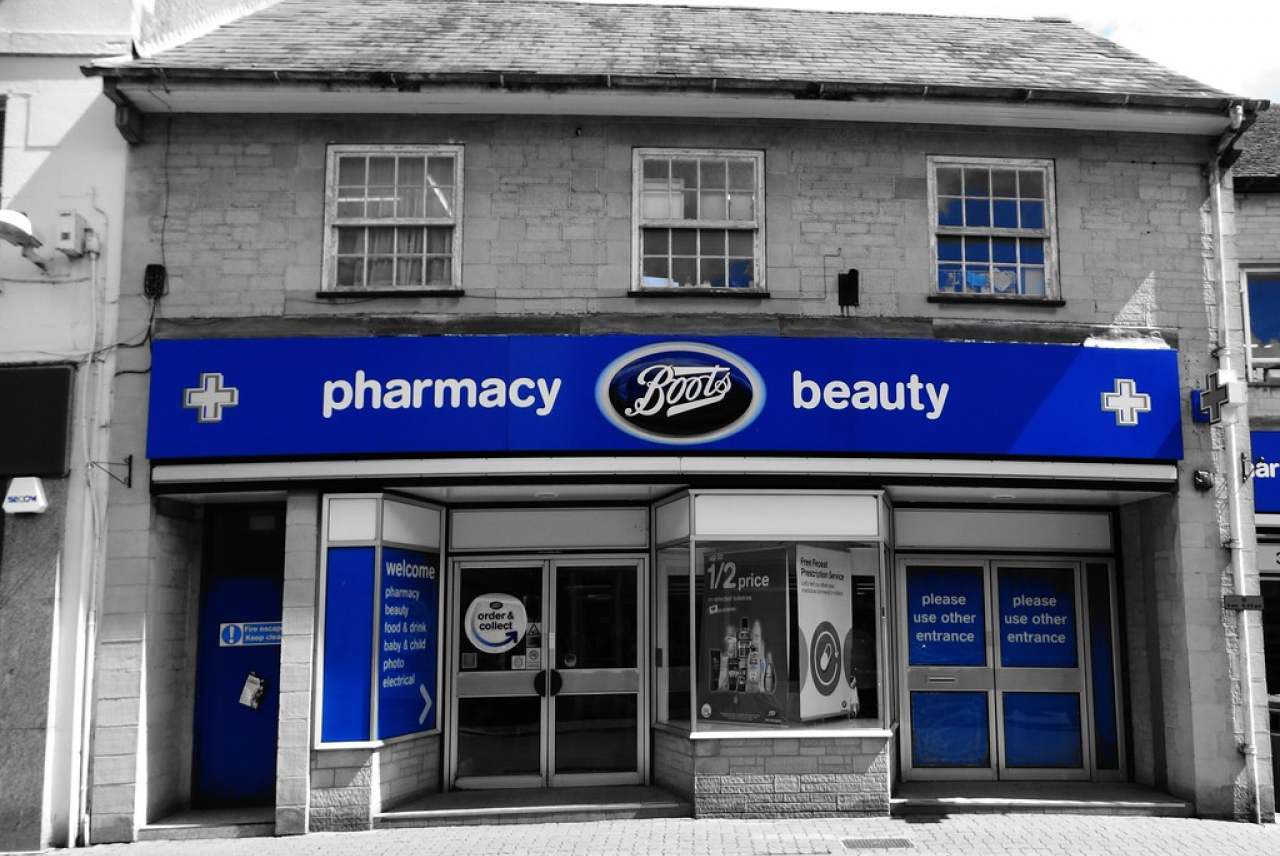Boots is one of the most high profile brands on the British high street. 90% of us apparently live ten minutes from one of its 2,500 shops. Its sale of medicines and health and beauty products means that it features in many of Ethical Consumer’s product guides including Over the Counter Medicine and Menstrual Products.
It has also been developing opticians, hearing centres and other health services which mean that it has been increasingly, and more controversially, picking up contracts from NHS outsourcing budgets.
Boots grew up us a family firm in Victorian Methodist Nottingham and developed a reputation for paternalism and dull-but-sensible pharmacy practice. And this legacy is enduring: in 2019 it was voted Top Retail Brand in YouGov’s Brand Index Women’s Choice ranking. But behind the scenes, something unsettling has been taking place.
2007: corporate raiders ride into town...
In 2006, Boots merged with the European pharmacy wholesaler Alliance Unichem to form Alliance Boots. In 2007, in what at the time was the largest ever ‘leveraged buyout’ in Europe, the new Alliance Boots was bought up by the infamous Wall Street corporate raider KKR. Leveraged buyout means that the purchase is funded by borrowing from banks in a way that turns the debt into one owned by the company that is bought. In the case of Boots, the more than £9 billion of borrowing was loaded onto its own balance sheet.
...and corporation tax payments vanish
In case you were thinking that this kind of clever financial engineering has few losers, the new owners quickly relocated the company headquarters from Nottingham to Zug in Switzerland (a well known tax haven). With such enormous debts to repay, subsequent years saw the apparent profits declared by the company decline to zero and corporation tax payments disappear. All this was despite apparently buoyant sales and a growing brand.
This led to the heath campaign group Medact and others to call for a government investigation into the company’s tax position. As you can see from its campaign graphic (above), it calculated that £1.21 billion of tax had been avoided in the period up to 2014 and identified the losers as ‘public services and public health’ (see ‘Campaigning against the commercialisation of healthcare’ overleaf for more).
2014: a multinational behemoth is born...
Other than systematically avoiding tax, the other thing we know about the corporate raider business model is that they don’t like to hang around for too long. Selling up and moving on is one of the ways that further value is ‘extracted’. In 2012 Walgreens, the largest drug-store company in the USA bought a 45% stake in Alliance Boots. They got on so well that in 2014 Walgreens exercised its option to buy the rest of Alliance Boots. The whole company was re-named Walgreens Boots Alliance Inc and has since grown to become the 36th biggest company in the world by sales. Its turnover of $136 billion in 2018 made it bigger than more well-known corporate giants like Mitsubishi, Microsoft and BMW.
...and scores poorly on ethics
Walgreens Boots Alliance scores poorly on Ethical Consumer’s ethiscore ranking (1.5). It is listed as a tobacco retailer in the US making its concern for healthcare conflicted to say the least. It also scores poorly for Excessive Directors’ Remuneration. Stefano Pessina, its CEO, earned over $13 million in 2017 with five other directors earning over £6 million each according to the companies 2018 annual report. Walgreen itself is registered in the ‘secrecy jurisdiction’ of Delaware and receives Ethical Consumer’s worst rating for likely use of tax avoidance strategies.
Of greatest concern is perhaps its low ranking for ‘Political Activity’. In 2018, in the USA alone, it spent $2.5 million on lobbying and made $491,292 in political donations. In 2017-18, 38 of its 45 lobbyists previously held government jobs. In Europe, Boots was listed as being supportive of the Transatlantic Trade and Investment Partnership (TTIP).10 According to campaigners, TTIP wanted to became the biggest trade deal in the world and aimed to remove ‘non-tariff barriers to trade’ which would benefit big business.
Although TTIP is now defunct, the recent visit of Donald Trump to the UK has again raised concerns of a similar post-Brexit trade deal that would force the UK to open up the NHS (further) to US business interests. Walgreens was also listed as a member of a couple of pro ‘market solutions’ lobby groups that Ethical Consumer tracks: eurocommerce.eu and the Business Roundtable in the USA. Seeing big healthcare corporations in this lobbying space is a worry.
Commercial values in a healthcare context
There are two other reasons why people are beginning to express concern about Boots’ renewed commercial focus under its new American parent.
1. Profits over people
A bottom-line focussed culture in pharmaceutical retail In a very detailed and troubling investigation in 2016, the Guardian’s Aditya Chakrabortty spoke to numerous pharmacists about a new bottom-line focussed culture at Boots. Of particular concern was the increasing amount of ‘self-checking’ that occurred at prescription dispensaries because of staff shortages. Because drugs can be dangerous in the wrong quantities, pharmacists should always check each others’ dispensing before medicines are handed over.
A survey of pharmacists quoted in the Guardian piece showed that the worries of staff about risks to customers because of ‘self-checking’ were worse at Boots than at even its most commercial competitors at Lloyds Pharmacy and ASDA. Another worry raised in the piece was ‘sales’ targets at Boots for other products and services like NHS-funded ‘Medicine User Reviews’. Medicine User Reviews are discussions with customers who have particular issues like serious conditions requiring long-term or complex medication. At Boots the targets were set at the maximum per store that the government would pay – whether or not there were customers that actually needed them.
Two years later, a Times investigation in 2018 suggested a similar pattern, with Boots charging the NHS between £1,843 and £3,220 for ‘special medicines’ bought by other pharmacists for £93.20. Special medicines are specially made up remedies for an individual’s particular needs and can include mouthwashes, sleeping pills and painkillers.
In a similar pattern, Boots’ US parent company Walgreens had to pay $269.2 million to settle US civil fraud lawsuits in January 2019. It was found to have improperly billed Medicare, Medicaid and other federal programs from 2006 to 2017 for hundreds of thousands of insulin pens it dispensed to patients it knew did not need them.
2. Pressure to outsource NHS contracts?
Surveys in the UK consistently show a large majority of people opposed to private companies operating within the NHS. Campaigners calculated in 2014 that roughly 40% of Boots revenue came from the NHS, either via prescription sales or outsourced services.
The campaigning website ‘NHS for Sale’ has documented a rise in outsourced contacts for Boots from diabetes and asthma testing to ‘clinical homecare’. Clinical home care covers a wide range of services from straightforward delivery of medication to specialist nursing for complex conditions. It noted that Boots was on record as saying how its link-up with Walgreens “would further enhance our capability to deliver such services, many of which are at a more developed stage in the US.”
As discussed above, it is clear that Walgreens Boots Alliance is a huge multinational with a profit-seeking culture and a high expenditure on lobbyists. It also has a financial interest in an NHS that has been designed to offer more outsourced contracts to private companies. With transparency around lobbying not yet sufficiently good, we cannot be sure that this is what it is doing, but it is a worry
nonetheless.
So, is Boots a trustworthy brand or a predatory multinational?
According to the Guardian, “Boots is sharply different and especially troubling...as a case of rogue capitalism”. It is also clear from some of the published research and comment that we have referred to above that many of Boots’ own staff are concerned
about its drift too.
Boots, in the 156 years prior to its buyout, showed that it was possible to run a private company in the healthcare space that was not so focussed on profit that people were becoming concerned. Are its customers and staff able to tell the new directors that they think they’ve got this wrong before it’s too late? Or is it time to take our custom elsewhere?




